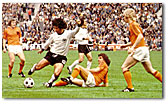
 nother
host triumph as the Germans took the new FIFA World Cup for the first time
with a quite exceptional display of the hard-running, interchanging style
in a tournament remembered for the arrival of "total football". nother
host triumph as the Germans took the new FIFA World Cup for the first time
with a quite exceptional display of the hard-running, interchanging style
in a tournament remembered for the arrival of "total football".

The attacking football played by
both teams continued incessantly. And just before the break, Germany's
centre-forward M?ller scored his most important goal (above) on the turn. |
The Netherlands, with Johan Cruyff outstanding, beat
Argentina 4-0 and Brazil 2-0 to announce their arrival, but could not overcome
West Germany in the final and went down 2-1, Gerd Mueller, "Der Bomber',
typically scoring the winner.
20 years on...
West Germany, after a somewhat shaky start to
the tournament, eventually ran into form to win "its" World Cup. In the
final, led by the "Kaiser", Franz Beckenbauer, the Germans were at the
top of their game to beat a brilliant Netherlands side. The 10th World
Cup tournament in Germany in 1974 was marked by the arrival of colour television!
And as if to highlight this cultural revolution even more, the "Welt-meisterschaft
74" featured two other major changes. The first was a change in the tournament
rules. The first round group system followed by knock-out in the second
round was replaced by a group system in both rounds. The second change
was the replacing of the Jules Rimet trophy - won outright by Brazil four
years earlier after winning the World Cup three times (1958, 1962, 1970)
- by a new solid gold statuette known as the "FIFA World Cup".
 East
Germany's 1:0 win over their political enemies from the west, on the opponent's
territory at that, may not have had much meaning in the sporting sense
since both teams had already qualified for the next round. But it certainly
had an emotional effect: the West Germans were shaken and their captain
Franz Beckenbauer reacted in a manner unusual for this part of the world
- he held a crisis meeting with the team and later appeared on television
to explain the situation to an unsettled public. With evident success;
20 years after the "Wonder of Bern" the West Germans went on to win their
second World Cup. East
Germany's 1:0 win over their political enemies from the west, on the opponent's
territory at that, may not have had much meaning in the sporting sense
since both teams had already qualified for the next round. But it certainly
had an emotional effect: the West Germans were shaken and their captain
Franz Beckenbauer reacted in a manner unusual for this part of the world
- he held a crisis meeting with the team and later appeared on television
to explain the situation to an unsettled public. With evident success;
20 years after the "Wonder of Bern" the West Germans went on to win their
second World Cup.
Can Scotland, at last, qualify for
the second round of a World Cup final tournament? They have not managed
it yet, but in 1974 they came very close. One win and two draws in their
group matches were still not enough and they were eliminated early. To
add to their disappointment they finally proved to be the only undefeated
team of the competition. |
Like its predecessor, the new trophy, sculpted by
Silvio Gazzaniga, was coveted by many, and 98 nations took part in the
qualifiers. Notable first-time qualifiers for the finals were East Germany,
Haiti, Australia and Zaire, the first sub-Saharan African nation to reach
the World Cup proper. But Hungary, Spain, France and most surprisingly
England all failed to make it through. As a prologue to its vanguard tournament,
FIFA appointed itself a new President, the first non-European, when the
Brazilian Jo? Havelange replaced Englishman Sir Stanley Rous, who had held
the post since 1961. On the field, the favourites, West Germany, qualified
for the second round, if rather unconvincingly. And following a defeat
at the hands of East Germany in the first round, there was even a minor
revolution: Beckenbauer, the team captain, was begged by his team-mates
to urge coach Helmut Sch? to make changes in the team's line-up and tactics.
For the team from the Netherlands, however, which
included in its ranks Cruyff, Neeskens, Rep and Rensenbrink, it was all
plain sailing as they qualified from both the first and second rounds,
beating Argentina (4-0), East Germany (2-0) and Brazil (2-0) by playing
the brand of "total football" made famous by the Dutch club side, Ajax.
The revelation of the tournament proved to be the multi-talented Polish
team which finished third, with its ace marksman Gzregorz Lato crowned
as the competition's top goalscorer (7 goals).
The Poles, however, could not stop the Germans
from reaching the final against the Netherlands. The final began dramatically
as Cruyff was brought down in the German penalty area following a solo
run. The Dutch took the lead from the ensuing Neeskens penalty before the
Germans had even touched the ball and with just a minute gone on the clock.
German pride was stung. Maier, Beckenbauer, Vogts - who thereafter stifled
Cruyff's influence - Hoeness and Overath soon fought their way back into
the game and finally triumphed 2-1 with goals from Breitner (penalty) and
M?ler. This was the Germans' second world title, twenty years after their
first victory in Switzerland in 1954.
Sources: FIFA Archives; CFO France
98; Ian Morrison: The World Cup - A Complete Record 1930-1990. Breedon
Books, Derby (UK) 1990.; John Robinson: Soccer - The World Cup 1930-1998.
Soccer Books Limited, Lincolnshire (UK) 1998 |
